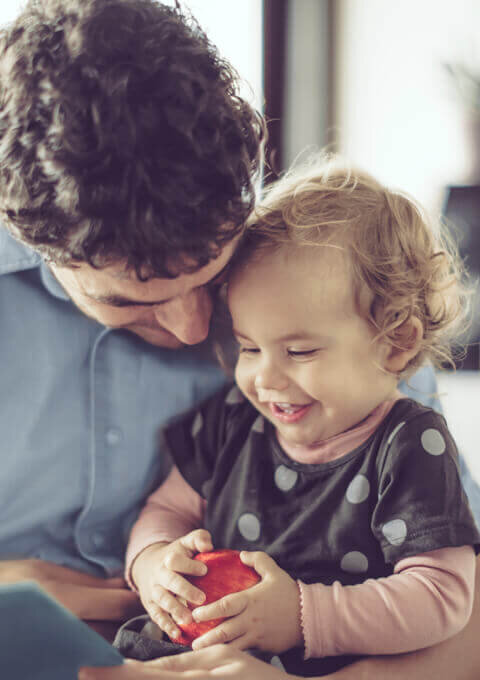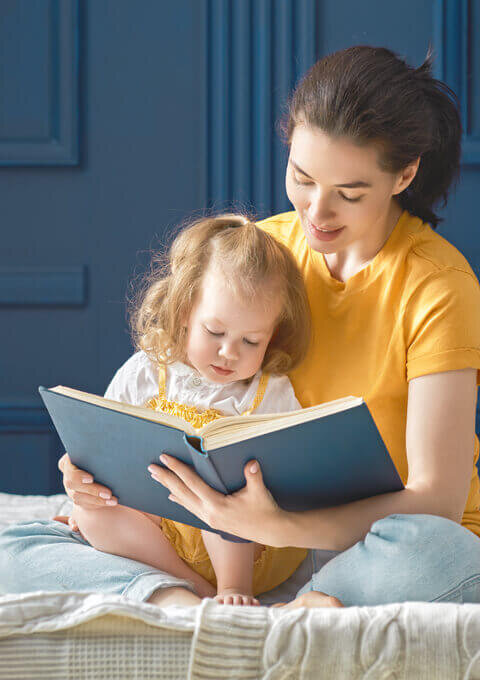When will my child start talking? - this question invariably bothers parents of young children. We will help you find the answer.
Speech learning is a longer process than you might think. It begins during foetal life, when the brain, larynx, vocal cords and tongue start to develop.
The baby begins to hear in the 5th month of foetal life. From that moment on, the baby gets accustomed to the sound of its mother's voice, with the melody and the rhythm of the language she uses. At the beginning of the 7th month of pregnancy, the baby can distinguish its mother's voice from the voice of another woman.
At the age of 2 - 3 months, the infant usually starts to coo, i.e. to make funny guttural sounds such as: gg, agh, gli or tli.
At 6 months, the baby starts babbling, which is just a clumsy attempt to imitate human speech. Initially, these are single syllables, e.g. ma, da, ba, which are then expanded to the syllable sequences: mamama or dadada. An infant at this age already knows that making sounds is a way of communicating and tries to mimic the intonation of adults.
At the end of the first year of life, a baby can already assign meaning to particular words and consciously cries out: mum, dad or give.
In the second year of life, the real fun begins. A toddler at this age has a lot to say. Between the age of 19 and 24 months, the child already speaks about 50-200 words, but it understands much more. It combines words in simple sentences, helping itself with gestures. Because children cannot fully verbalise their thoughts or articulate particular words, they begin to create their own words and sometimes even their own language. During this period, all funny sayings or twisted words appear, which often enter the family dictionary forever. However, it is worth correcting the child from time to time to avoid fixing errors.
Each child develops at its own individual pace. At the age of two, some children speak non-stop using full sentences, while others use only a few words invented by themselves and their favourite word “no”. It often arouses unnecessary anxiety in parents.
Up to the 27th month the child should know about 300 words, while “word” should be understood as every cluster of sounds with the meaning given by the child. The word will be “mom” but also “ha” if it means a dog or “bu” if it is used consistently in relation to shoes, slippers or sandals. There are up to 200 such invented words in a toddler's dictionary.
There are situations in which it is worth consulting a specialist. If you notice that your toddler has problems with swallowing or chewing, consider a visit to a speech therapist or neurologist. Consultation with a specialist is also indicated if the child is already 27 months old and still:
You should not be guided by the principle that boys start to speak later than girls. If the child still does not speak at the age of 2.5 years, regardless of his or her gender, you should ask a specialist.
Have your child's hearing tested!
If there are disturbing signals related to speech development, your child should have phoniatric examinations to rule out hearing problems.
First of all, you should talk to your child. When you are pregnant, you should speak to your baby as often as possible - no doubt it can hear you.
If you already have an infant at home:
To avoid later problems with speech, make sure that your child's tongue, lips and teeth develop properly.
When a child begins to speak, there may be a moment when this somewhat clumsy speech does not keep up with the huge amount of thoughts swirling in its head. Stuttering may then appear. This is usually physiological stuttering and disappears with the right approach. It is important not to urge or mock the child. Otherwise, physiological stuttering can turn into disease-related stuttering.
You can introduce exercises that stimulate speech development. If they are in the form of play, the child will be happy to do them.
You cannot require your child to speak correctly right away. Do not make your child correct its mistakes every time. Sometimes repeat its words in the correct form. Never make fun of its mistakes.
To achieve this, have fun together:
You will have fun and the benefits for speech development will be invaluable.
Talk to your child face to face.
Thanks to this you can observe how its tongue and lips work. The baby will see your facial expressions and reaction to its words.
Hearing is also very important for speech development. There are many words in Polish that sound very similar, for example, fotel (chair) - hotel (hotel), kura (hen) - góra (mountain). Sometimes children are not able to detect differences at all. Therefore, have fun in guessing games.
You can put various materials, for example sand, rice, beans, pebbles or peas into opaque containers. It is important that the same thing is always in two containers. By shaking the containers the child has to find matching pairs.
Not everyone knows that manual activities are of key importance to speech development. In the brain, the centre responsible for moving the hand is adjacent to the mouth control centre. With intensive work of one of these centres, the neighbouring one is also stimulated. This is why we gesticulate when we speak or stick out the tongue when we try to precisely do some work with our hands.
So if we want to help our child to speak, we should encourage them to play manual games. Drawing, painting, cutting or tearing paper, kneading plasticine, etc., will work great.
The skill of biting food is required for independent eating and is crucial for the proper development of speech. To adults this skill seems to be obvious, however, the baby must learn it
Beloved tiny hands, legs, eyes, ears, and nose - all so small, delicate and completely dependent on mum and dad's care. The very thought of baby's bath is enough to make beginning parents stiff with fear, but the advanced ...
The extent and range of progress achieved by your baby during his first years is incredible. From a tiny, lying mite who does not yet know where his nose is, to a quite smart toddler who has a lot to say on any subject, climbs ...
How to deal with cold, and react to first signs of infection, what you can do at home and when you should contact a doctor - you can find all this information in our article.
There are times when your baby will not fall asleep for hours, and then will wake up in the middle of the night and start his day at three in the morning. You are wasted, feel helpless and at the end of your tether. We cannot ...

